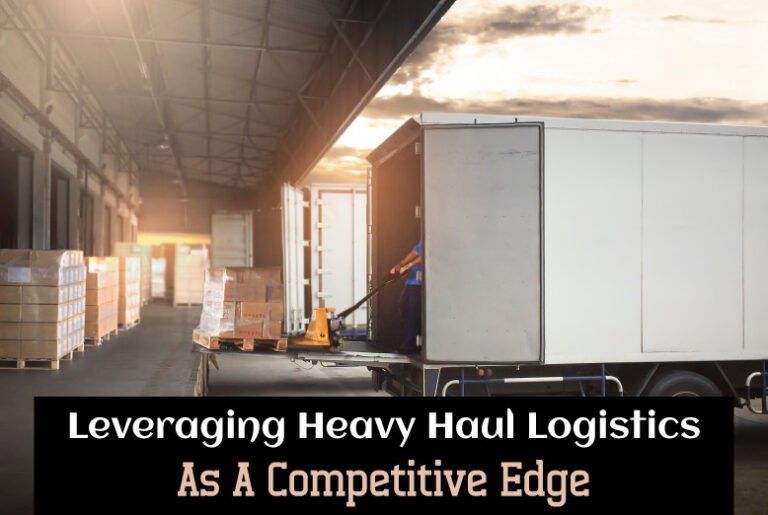In the bustling world of business, where the slightest edge can be the difference between leading the market and falling behind, leveraging every aspect of your operation for competitive advantage isn’t just wise; it’s imperative. Among these, heavy haul logistics stands out as a critical but often underestimated component. This specialized field, which deals with the transportation of oversized or overweight cargo, can be a game-changer in industries where large machinery or equipment is a cornerstone of the operation.
Understanding and optimizing your heavy haul logistics can significantly impact your bottom line, not just by ensuring the safe and timely delivery of your goods but also by improving overall efficiency and reducing costs. In a landscape where logistical challenges can stall projects and inflate budgets, mastering this aspect of supply chain management offers you a distinct advantage, making it possible to outmaneuver competitors and consistently exceed customer expectations.
- Strategic Planning And Execution
Successful transportation requires meticulous planning, including route surveys to avoid low bridges or weak road surfaces that could impede transport. For instance, companies specializing in Houston heavy equipment transport excel by conducting thorough pre-journey planning, ensuring each move is as efficient and safe as possible.
A notable success story involves a challenging delivery completed ahead of schedule with no incidents, showcasing the power of detailed strategic planning and coordination. This level of preparation can reduce the risk of delays and additional costs, underscoring that a well-thought-out logistics strategy is essential for competitive success.
Executing these plans requires coordination with various stakeholders, including local authorities for permits and escorts. Your logistics team must adjust plans on the fly, as unexpected challenges such as adverse weather or road closures can arise. This flexibility is crucial for maintaining timelines and keeping projects on track.
- Safety And Compliance
Ensuring the safety of both cargo and personnel is paramount in heavy haul logistics. Adhering to safety standards and regulations not only protects your assets but also solidifies your reputation as a reliable and responsible business partner. Implementing rigorous training programs for your logistics team and drivers ensures they’re well-versed in handling oversized loads and the specific challenges they present, including the latest safety technologies like collision avoidance systems and GPS monitoring for enhanced safety protocols.
Compliance with local, state, and federal regulations is another critical aspect. This includes securing the necessary permits and understanding the restrictions that might affect your cargo’s movement. Failure to comply can result in significant fines, legal challenges, and damage to your reputation.
- Cost Management
Effective cost management in heavy haul logistics is about finding the balance between minimizing expenses and maximizing value. Optimizing route selection for efficiency and cost-effectiveness significantly reduces fuel consumption and wear on transportation equipment. Negotiating contracts with reliable carriers and service providers can lead to substantial savings.
Building long-term relationships with service providers can unlock preferential rates and services, further reducing costs. By carefully managing expenses without compromising on quality or safety, you’re able to offer competitive pricing to your clients while maintaining healthy profit margins.
- Building Strong Partnerships
In heavy haul logistics, success often depends on the strength of your partnerships. Developing strong relationships with carriers, equipment providers, and regulatory bodies streamlines the logistics process, making it easier to navigate challenges and secure necessary permits and escorts.
Collaboration with clients is equally important. Understanding their specific needs and challenges allows you to tailor your logistics solutions, providing a level of service that differentiates you from competitors. A recent partnership with a major construction firm demonstrated the value of close collaboration, leading to the efficient execution of a multi-phase project under tight deadlines.
Finally, being an active member of industry associations can provide valuable insights into best practices, regulatory changes, and networking opportunities. These relationships can be invaluable resources for staying ahead of the curve and identifying potential collaboration or business opportunities.
- Technological Advancements
Embracing technological advancements in heavy haul logistics can provide a significant competitive advantage. Modern GPS and tracking technologies offer unprecedented visibility into the transport process, allowing real-time updates and adjustments. This enhances efficiency and customer satisfaction by offering timely cargo updates.
Automation and AI are revolutionizing route planning and optimization, enabling logistics planners to quickly identify the most efficient routes, even in complex scenarios involving multiple stops and varying load sizes. This has led to substantial time and fuel savings for multiple projects, underscoring the transformative impact of technology in logistics.
Technology also facilitates better communication and collaboration between all parties involved in the logistics chain. Digital platforms enable seamless information exchange, from permit applications to cargo tracking, making the entire process more transparent and efficient.
The Bottom Line
Leveraging heavy haul logistics as a competitive edge requires a multifaceted approach, encompassing strategic planning, safety and compliance, cost management, technological advancements, and building strong partnerships. By focusing on these key areas, you’re not just able to navigate the complexities of transporting oversized loads but also transform logistical challenges into opportunities for growth and differentiation. In a competitive landscape, the ability to efficiently and reliably manage heavy haul logistics isn’t just an operational necessity; it’s a strategic asset that can set your business apart and drive long-term success.
Ava Thompson
Ava Thompson is a logistics specialist with a focus on heavy haul transportation solutions. Drawing from her expertise in the field, she explores how businesses can leverage heavy haul logistics as a competitive edge. Through her articles and consultations, Ava empowers companies to optimize their transportation strategies for efficiency and cost-effectiveness. Outside of work, she enjoys hiking, photography, and attending industry conferences to stay updated on the latest trends.
Also Read: 7 Smart Tips To Reduce Transportation Logistics Costs



